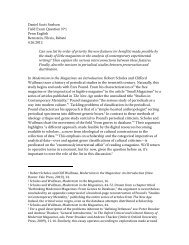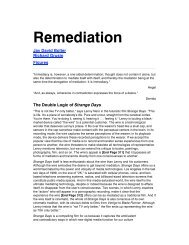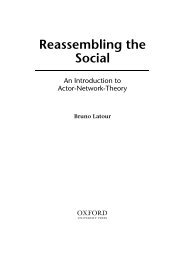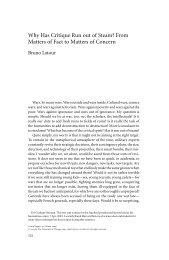The Exploit: A Theory of Networks - asounder
The Exploit: A Theory of Networks - asounder
The Exploit: A Theory of Networks - asounder
Create successful ePaper yourself
Turn your PDF publications into a flip-book with our unique Google optimized e-Paper software.
70 Nodes<br />
swarming is simply a reminder <strong>of</strong> the defacement that runs through<br />
all instances <strong>of</strong> “facing” the other.<br />
“<strong>The</strong> face is produced only when the head ceases to be part <strong>of</strong> the<br />
body.” 39<br />
Biopolitics and Protocol<br />
<strong>The</strong> discussion <strong>of</strong> swarming and networking hints again at a point<br />
made throughout this book: that the preponderance <strong>of</strong> network forms<br />
<strong>of</strong> organization in no way implies an absence <strong>of</strong> power relations or <strong>of</strong><br />
control structures. In fact, it prescribes them. But the kinds <strong>of</strong> power<br />
relations and control structures are not necessarily those <strong>of</strong> top - down<br />
hierarchies. <strong>The</strong>y are <strong>of</strong> another order.<br />
Additionally, we should stress that all this talk about networks is<br />
not restricted to the discussion <strong>of</strong> technical systems. <strong>Networks</strong> can be<br />
technological, yes, but they are also biological, social, and political.<br />
Thus what is at stake in any discussion <strong>of</strong> the political dimensions <strong>of</strong><br />
networks is, at bottom, the experience <strong>of</strong> living within networks,<br />
forms <strong>of</strong> control, and the multiple protocols that inform them. As we<br />
suggest, networks are always “living networks,” and <strong>of</strong>ten what is produced<br />
in living networks is social life itself. That is, if there is something<br />
that results from networks, something produced from networks,<br />
it is the experience <strong>of</strong> systematicity itself, <strong>of</strong> an integration <strong>of</strong> technology,<br />
biology, and politics. <strong>Networks</strong> structure our experience <strong>of</strong><br />
the world in a number <strong>of</strong> ways, and what is required is a way <strong>of</strong> understanding<br />
how networks are related to the aggregates <strong>of</strong> singularities—both<br />
human and nonhuman—that are implicated in the network.<br />
What is required, then, is a way <strong>of</strong> understanding politics as<br />
biopolitics.<br />
Michel Foucault calls “biopolitics” that mode <strong>of</strong> organizing, managing,<br />
and above all regulating “the population,” considered as a biological, species<br />
entity.<br />
Broadly speaking, biopolitics is a historical condition in which<br />
biology is brought into the domain <strong>of</strong> politics; indeed, it is the moment









